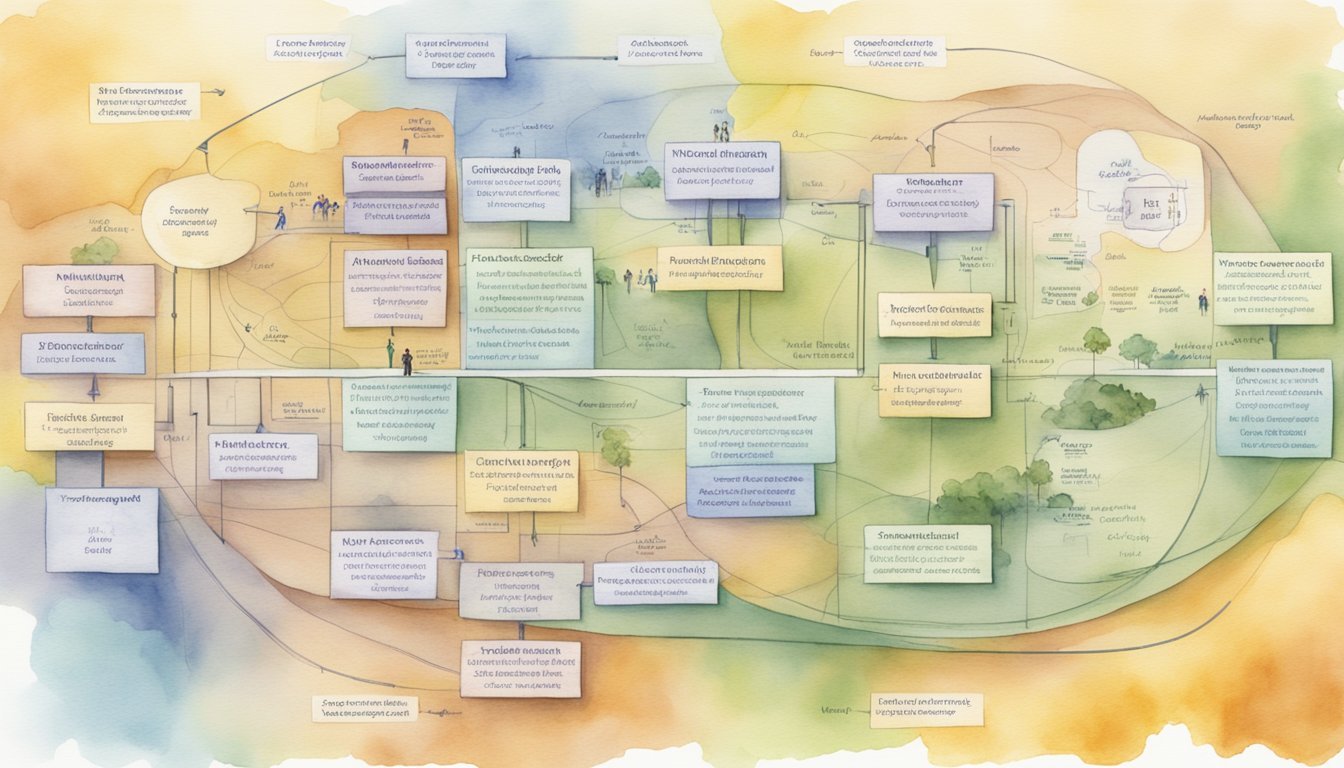AIT Schools: Revolutionizing Modern Education

If you’re considering a career in the Army, understanding Advanced Individual Training (AIT) is crucial.
AIT is where you learn specialized skills for your Military Occupational Specialty (MOS), the specific job you’ll perform in the Army.
From artillery to engineering, AIT schools offer hands-on training that prepares you for your role.

Each AIT location is designed to provide you with the best training for your specific job.
For instance, MOS 15H receives primary training in Alabama, focusing on engine disassembly and repair, an essential skill for helicopter mechanics.
The curriculum combines classroom instruction with practical exercises to ensure you master the necessary skills.
AIT also plays a significant role in developing your discipline and work ethic.
Beyond technical training, you’ll learn leadership and team-building skills vital for any military career.
This comprehensive approach ensures you’re ready for the challenges of your future role.
Key Takeaways
- AIT is essential for learning specialized Army job skills.
- Each AIT location offers tailored training for specific Military Occupational Specialties.
- You’re trained in both technical skills and leadership during AIT.
Understanding Advanced Individual Training (AIT)
Advanced Individual Training (AIT) is essential for new Army recruits, focusing on specialized training for different Military Occupational Specialties (MOS).
It builds on the skills learned in Basic Combat Training (BCT).
The AIT Experience
In AIT, you learn technical skills specific to your MOS.
This training is intensive and prepares you for the roles and responsibilities you’ll handle in your Army career.
The environment is structured, emphasizing both discipline and teamwork.
You will live in barracks, follow a strict schedule, and participate in physical training.
This phase also includes classroom instruction and hands-on practice.
The goal is to make you proficient in your chosen field, ensuring readiness for real-world military operations.
Timeline and Phases
AIT varies in length depending on your MOS, ranging from a few weeks to several months.
The training is divided into distinct phases.
- Phase IV: The initial phase focuses on the transition from BCT, reinforcing basic soldiering skills.
- Phase V: This phase involves more specialized and technical training relevant to your MOS.
Each phase builds on the last, gradually increasing in complexity and responsibility.
Successful completion of each phase is crucial to proceeding to the next.
AIT and MOS Relationship
Your MOS determines the specific training you receive during AIT.
Different MOS options include fields like engineering, medical, intelligence, and logistics.
Each field requires unique skills and knowledge.
For example, if your MOS is air defense, you’ll learn radar operations at a specific AIT school.
If your MOS is practical nursing, the training will focus on medical skills and patient care.
The alignment between AIT and MOS ensures that you are well-prepared for your duties within the Army.
Proper training in your MOS is vital for your success and effectiveness in the field.
This specialized approach helps the Army maintain a highly skilled and efficient force.
AIT Schools by Specialty

Advanced Individual Training (AIT) schools provide specialized training based on your Military Occupational Specialty (MOS).
Each school focuses on teaching the critical skills needed for your specific role in the Army.
Infantry School
The Infantry School, located at Fort Benning, Georgia, trains soldiers for combat roles.
Here, you will learn weapon handling, tactical operations, and survival skills.
The training is physically demanding and requires mental toughness.
You will participate in live-fire exercises, field training exercises, and urban operations training.
This school prepares you for the operational challenges faced by infantry units in diverse environments.
Ordnance Mechanical Maintenance School
The Ordnance Mechanical Maintenance School at Fort Lee, Virginia, focuses on training soldiers to maintain and repair military equipment.
This includes vehicles, weaponry, and electronic systems.
You will learn skills in diagnostics, troubleshooting, and repairs.
Courses cover both theoretical knowledge and hands-on practice.
This training ensures that the Army’s equipment remains in top working condition, which is vital for mission success.
Transportation School
The Transportation School, also located at Fort Lee, Virginia, teaches soldiers how to manage the Army’s transportation needs.
Training covers vehicle operations, logistics planning, and the coordination of transportation assets.
You will learn to operate a variety of military vehicles and understand the intricacies of supply chain management.
This school is essential for ensuring that personnel and materials move efficiently within and between locations.
Military Police School
Located at Fort Leonard Wood, Missouri, the Military Police School trains soldiers to enforce laws and regulations on military installations.
The training includes law enforcement techniques, criminal investigations, and physical security measures.
You will learn crowd control, military justice, and prisoner handling.
This prepares you to ensure the safety and security of both military personnel and assets, which is crucial for maintaining order within the military community.
Aviation Logistics School
The Aviation Logistics School at Fort Eustis, Virginia, specializes in the logistical support of Army aviation units.
You will learn about the maintenance of aircraft, supply chain management, and the logistics of supporting aviation operations.
Training includes both classroom instruction and hands-on experience with aircraft and aviation support equipment.
This school ensures that aviation units have the support they need to maintain operational readiness.
Training Locations and Facilities

Army Advanced Individual Training (AIT) takes place at various locations across the United States.
These training centers are specialized and offer focused instruction based on different Military Occupational Specialties (MOS).
Fort Benning and Infantry Training
Fort Benning, located in Georgia, is the primary training site for infantry soldiers.
Here, you will undergo rigorous physical training and combat exercises that prepare you for various missions.
The facilities at Fort Benning include state-of-the-art shooting ranges, obstacle courses, and simulators.
You’ll also be trained in small unit tactics, urban warfare, and weapon handling.
Fort Benning is well-known for its high standards and challenging environment, providing you the essential skills for front-line combat roles.
Fort Leonard Wood for Engineering Disciplines
Fort Leonard Wood, based in Missouri, specializes in engineering disciplines.
At this location, you can expect to be trained in military engineering tasks, including construction, demolition, and environmental management.
The post offers specialized facilities like demolition ranges, bridge-building sites, and construction equipment.
Training here equips you with the knowledge and skills needed for engineering support in various military operations.
This post is vital for soldiers pursuing careers in the Corps of Engineers.
Fort Eustis and Transportation Expertise
In Virginia, Fort Eustis focuses on transportation and logistics training.
The post is equipped with a variety of transportation vehicles and simulators for hands-on training.
You will learn about logistics management, vehicle maintenance, and coordination of supply lines.
Fort Eustis also includes a port facility where you can train in the loading and unloading of military equipment.
This specialized training ensures you are well-prepared for roles involving the transport and supply of troops and equipment.
Fort Gordon’s Signal Corps Training
Fort Gordon, located in Georgia, is the hub for Signal Corps training.
Here, you will receive instruction in military communications, including radio operations, satellite communications, and cybersecurity.
The facilities include advanced computer labs, signal support systems, and field training areas.
Fort Gordon is essential for those who will manage the Army’s communication networks, ensuring that you are capable of maintaining secure and reliable communications in various operational environments.
This section ensures you understand the essential details of AIT training locations and their specific focuses, preparing you for the different types of training environments you may encounter.
Curriculum and Hands-on Training

In Advanced Individual Training (AIT) schools, you will focus on technical and tactical proficiency, field instruction applications, and specialized equipment handling.
These areas are essential for developing the skills necessary for your Military Occupational Specialty (MOS).
Technical and Tactical Proficiency
You will receive training on various technical and tactical skills specific to your MOS.
This includes hands-on sessions with small arms and proper usage of ammunition.
Classroom instruction is combined with practical exercises to ensure you can operate effectively in different scenarios.
You will learn not only how to use equipment but also how to maintain and troubleshoot it.
By the end of your training, you should be comfortable with a wide range of tasks required in your role.
Field Instruction Applications
Field instruction is a vital part of AIT.
You will apply what you learned in the classroom to real-world environments.
This could involve simulated combat scenarios where you’ll need to demonstrate your skills in using small arms and managing ammunition under pressure.
Hands-on training here helps you to build confidence and adaptability.
You’ll practice tactical maneuvers and other critical field operations to ensure you can perform your duties effectively in any situation.
Specialized Equipment Handling
In addition to general equipment, you will learn to handle specialized tools and machines essential for your MOS.
This includes training on both common and advanced pieces of equipment.
You will receive detailed instructions on operation, maintenance, and safety protocols.
Practical sessions focus on hands-on training with this equipment to ensure you can handle it proficiently.
This part of the curriculum ensures you are well-prepared to use and maintain any specialized equipment you might encounter in your military career.
Roles and Career Progression

In the Army, your journey doesn’t end after completing AIT.
Career progression involves specialized roles, continuing education, and opportunities for leadership.
Each step along the way builds on the training you’ve received and prepares you for future responsibilities.
From AIT to First Assignment
After completing Advanced Individual Training (AIT), you receive your first duty assignment.
This is where you put your Military Occupational Specialty (MOS) training into practice.
Your first assignment may vary based on your MOS and needs of the Army.
You typically work under the guidance of more experienced soldiers and officers to gain practical experience.
This helps in developing your skills and knowledge further.
Early roles can involve hands-on tasks, technical duties, or logistical support, depending on your MOS.
Career Fields and Opportunities
The Army offers a variety of career fields that cater to different interests and skills.
You can pursue paths in fields like engineering, medical, logistics, intelligence, and infantry.
Each field provides unique job training and opportunities for advancement.
As you progress, you may receive additional training or certifications.
Leadership roles are a significant part of career progression.
You might become a non-commissioned officer (NCO) or pursue officer training, broadening your responsibilities.
Advancing in your career often means mentoring new recruits and contributing to mission planning.
This continuous development is crucial for reaching higher ranks and more specialized roles within your chosen career field.
Support and Administrative Services Education

In the military, support and administrative services are crucial for the smooth operation of logistics, financial management, and personnel administration.
These roles ensure that resources are managed effectively and that soldiers receive the support they need.
Quartermaster School for Logistics
Quartermaster School focuses on logistics, covering crucial areas such as water, food, and material supply.
You will learn about managing supply chains, ensuring that troops have the necessary provisions, and maintaining equipment.
The training includes inventory management, storage, and distribution.
You will also become skilled in handling various types of supplies, from basic necessities to advanced materials.
This school prepares you to manage logistical challenges and ensure that operations run smoothly.
Effective logistics management directly impacts the success of military missions, making this training essential.
Financial Management School Training
The Financial Management School educates you on the vital aspects of military finance.
This includes budgeting, accounting, and financial reporting.
You’ll learn how to manage funds allocated for different operations, ensuring that all financial transactions comply with regulations.
You will also study financial planning and analysis.
This training prepares you to handle economic challenges and resource allocation, ensuring that all units are financially supported.
Effective financial management is key to sustaining operations and supporting troops in the field.
Adjutant General School
Adjutant General School focuses on personnel administration and support.
You’ll receive training in managing soldier records, benefits, and human resources.
This includes processing leave requests, promotions, and assignments.
You’ll also learn about counseling and career services, helping soldiers with their professional development.
This school ensures that you can effectively support the human aspect of military operations, providing the care and assistance soldiers need to perform at their best.
In this role, you will be the backbone of the military, ensuring that all personnel-related matters are handled efficiently and accurately.
Knowledge in this area ensures that the needs of the soldiers are met, maintaining morale and operational effectiveness.
Specialized Technical Training

Specialized technical training in AIT schools provides in-depth focus on various fields such as engineering, chemical defense, and medical services.
These training programs are designed to equip soldiers with the skills they need to excel in these important areas.
Engineering and Construction
Engineering and construction roles in the Army require knowledge in mechanical systems, electrical systems, and civil engineering.
As a soldier, you might work on projects like building bridges, roads, and airfields.
Training includes blueprint reading, machinery operation, and material handling.
You will also learn to use advanced construction equipment, making you capable of managing both small and large-scale projects efficiently.
Chemical, Biological, Radiological, and Nuclear Defense
Specialists in this field are trained to handle chemical, biological, radiological, and nuclear (CBRN) threats.
Training involves detection and identification of CBRN agents, as well as decontamination procedures.
Using advanced technology and equipment, you will learn to protect fellow soldiers and civilians from dangerous substances.
This role is critical in safeguarding health and maintaining operational readiness.
Health and Medical Services
In health and medical services, training focuses on lifesaving skills and medical support.
You’ll learn to provide emergency care, manage medical supplies, and support medical staff.
Training covers a wide range of medical tasks, from basic first aid to more complex procedures.
This prepares you to handle medical emergencies in various environments, ensuring that you can provide immediate and effective care.
Military Leadership Development

Military leadership training is crucial for advancing in rank and learning how to command others. Officer Candidate School and Warrant Officer Candidate School are important programs that help prepare soldiers for leadership roles.
Officer Candidate School
Officer Candidate School (OCS) is designed for enlisted soldiers and civilians with at least a bachelor’s degree who wish to become officers.
The program usually lasts about 12 weeks.
During this time, you will learn leadership skills, military tactics, and ethical standards.
You will also go through physical training and drills that test your endurance and mental toughness.
OCS focuses on building your ability to make quick, effective decisions under pressure.
You’ll be trained in areas like military law, land navigation, and combat operations.
By the end of the course, you’ll participate in a final exercise that tests all the skills you’ve learned.
Successful completion of OCS leads to commissioning as a second lieutenant, where you can begin your journey as an officer in the U.S. Army.
Warrant Officer Candidate School
Warrant Officer Candidate School (WOCS) is for enlisted personnel who want to become warrant officers, which are specialists in technical areas such as aviation and engineering.
The program typically lasts about five to seven weeks.
During WOCS, you will work on advanced leadership skills and technical expertise related to your field.
The curriculum includes classes on military justice, leadership theories, and advanced military tactics.
Physical training remains a key component, ensuring you’re physically prepared for the demands of the role.
You’ll also develop your ability to lead small teams and manage resources efficiently.
Graduates of WOCS earn the rank of warrant officer and are assigned roles that align with their technical specialties, offering a unique leadership path within the Army.
AIT School Policies and Regulations
In Advanced Individual Training (AIT) schools, strict policies ensure discipline and readiness.
These regulations focus on standards of conduct, health, and well-being.
Standards of Conduct
Maintaining discipline in AIT schools is crucial.
Trainees must follow rules set by the TRADOC Regulation 350-6.
You are expected to adhere to all orders from superiors.
Disobedience can lead to severe consequences, including dismissal.
Punctuality and attendance are mandatory.
Missing classes without a valid reason can affect your progress.
Proper military attire is required at all times, and uniforms must be neat and clean.
Respect towards instructors and peers is a must.
Any form of harassment or disrespectful behavior is not tolerated.
Violations of these conduct rules can result in punishment, ranging from extra duties to legal action.
Health and Well-being Policies
Your health and well-being are paramount in AIT.
Policies outlined in TRADOC Regulation 350-18 ensure that you receive adequate medical care.
Regular health checks are mandatory.
Physical fitness is a key part of AIT.
You will participate in daily physical training (PT) sessions to maintain optimal fitness levels.
Failure to meet fitness standards can delay your training.
Mental health support is also available.
You will have access to counselors and mental health services.
Personal financial management training is provided to help you manage your finances effectively.
This is crucial for long-term readiness and stability.
In summary, adhering to these regulations ensures your success and preparedness for future assignments.
Frequently Asked Questions
In this section, you can find answers to common questions about Advanced Individual Training (AIT) for the U.S. Army.
How long does AIT training typically last?
The length of AIT training varies.
For example, training for MOS 68H lasts 24 weeks.
Can family members attend AIT graduations?
Yes, family members are usually welcome to attend AIT graduations.
Specific details may vary by location and schedule.
What is the distinction between basic training and AIT for Army personnel?
Basic training focuses on fundamental military skills.
AIT, on the other hand, prepares you for your specific Military Occupational Specialty (MOS).
Are soldiers permitted to return home immediately after completing AIT?
Whether you can return home immediately post-AIT depends on your next assignment.
Some may get leave, while others may report directly to their unit.
What locations host AIT training for the United States Army?
Several locations across the U.S. host AIT schools.
Your specific MOS will determine which location you will attend.
How does AIT differ for those in the National Guard compared to active duty Army?
AIT for National Guard members is generally similar to that for active duty soldiers.
However, the schedule might differ due to their part-time status.






